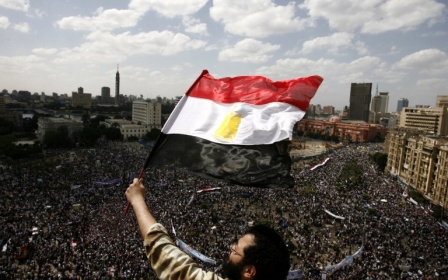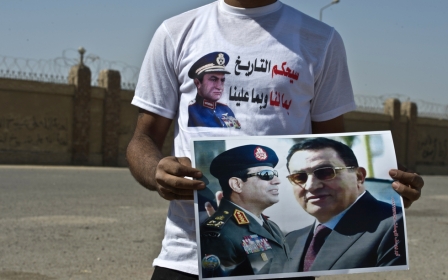Police raid thousands of homes in Cairo over calls for anniversary protests

Egyptian police have been questioning residents and searching thousands of homes in the run-up to the fifth anniversary of the 25 January uprising, authorities said.
According to officials who spoke to the Associated Press news agency, more than 5,000 houses and apartments have been inspected in central Cairo as a “precautionary measure”.
A senior security official told AP that the 10-day search campaign was the result of months of surveillance and intelligence gathering. He said that pro-democracy activists, living in Egypt and abroad, were the main targets of the probe.
His statement came as a large bomb blast ripped through an apartment building in Cairo, near the pyramids, after police tried to raid the home of alleged militants. More than a dozen people were injured, while 10 people, including seven policemen and three civilians, were killed, authorities said.
Egypt has been in turmoil since the 2011 overthrow of former president Hosni Mubarak. While the country was able to host elections largely deemed free and fair in 2012, the country’s first democratically elected president Mohamed Morsi was overthrown by a popularly backed coup a year later.
Since then, the country has seen a spike in militant activity with a group linked to the Islamic State carrying out regular attacks in the Sinai. Smaller attacks have also targeted Cairo.
Tens of thousands of alleged Muslim Brotherhood supporters have been arrested and the group dubbed a terrorist organisation, despite its denials that it promotes violence. Leftists and youth leaders, who played a key part in the 2011 uprising, have also found themselves targeted by the authorities that have banned key groups and imprisoned leaders.
Journalist Emir Nader told the Guardian newspaper that his home had been raided on 18 January.
“I logged in to my Facebook and found messages from my friends in Cairo asking whether it was my flat that was targeted downtown,” he said.
“I scrolled through and discovered friends and activists had reported my flat had been raided by police two hours previously and my three flatmates were arrested.”
According to the paper, his roommates were well-known activists working on prisoner’s rights.
“We think the police have been knocking on every door downtown and when a young Egyptian opens they search the flat,” Nader told the Guardian.
“They discovered that Taher, a doctor, is a critic of the government and campaigns for medical treatment for detainees. They decided this was incriminating enough to arrest all three of my flatmates for possessing materials that call for overthrowing the state.”
Other searches, however, appear to have happened almost at random with whole apartment blocks and floors searched by authorities.
Public protest, without prior approval from the state, has now been banned in Egypt. Several youth activists were arrested earlier this month for apparently calling on people to take to the streets on 25 January, with some media professionals also reportedly targeted by authorities.
Middle East Eye propose une couverture et une analyse indépendantes et incomparables du Moyen-Orient, de l’Afrique du Nord et d’autres régions du monde. Pour en savoir plus sur la reprise de ce contenu et les frais qui s’appliquent, veuillez remplir ce formulaire [en anglais]. Pour en savoir plus sur MEE, cliquez ici [en anglais].




